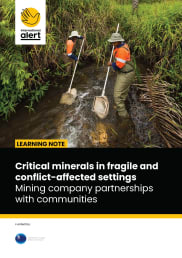Towards a peace economy in Lebanon
This report is concerned with the ways in which governance of Lebanon’s economy underpins its structural and overt conflict dynamics.
The limitations of the 1989 Taif Agreement in creating the foundations for lasting peace in Lebanon following 15 years of bitter civil conflict are widely recognised. The power-sharing agreement, in some respects, represents an evolution of long-standing traditions distributing power across the leadership of Lebanon’s diverse religious communities.
However, it is seen by many as little more than a ceasefire, rather than a genuine platform for change. In its aftermath, political parties have failed to fully transition away either from wartime structures and practices, or from the pre-war practices that can be viewed as having fuelled the war in the first place.
The Taif Agreement essentially entrenched the grip on power of conservative elites from across the primary confessional divides, leading to subsequent stalemate across key areas of political decision-making. In the words of two journalists: “The Taif accord ended the civil war, but in reality the war moved away from the battlegrounds to a cold political war.”
Lebanon’s geostrategic significance, on the doorstep of the Israel-Palestine conflict, and as a proxy to its powerful and mutually hostile regional neighbours, Iran, Israel, Saudi Arabia and Syria, creates a wider environment in which efforts to build more inclusive and progressive domestic politics are under constant surveillance and threat from outside. At the same time, Lebanon’s political leaders are skilled in taking advantage of regional insecurity to mobilise sectarian fear and support for their own agendas.
In recent years, the drift away from narratives of Arab nationalism towards sectarian and religious intolerance in the wider region, now manifesting most dramatically in the chaos of Syria’s civil war, have further ratcheted both political and socio-economic pressure onto Lebanon’s fragile status quo. Syria’s experience equally serves as a cautionary tale inspiring renewed efforts to build resilience and peace at home.
The report includes case studies that collectively illustrate how the system of sharing political power across conflict actors ostensibly representing sectarian power groups has directly enabled their dominance of economic opportunity in the post-war era. In particular, active engagement in the primary economic sectors on the part of political actors that dominate the ‘private sector’ presents significant opportunities for enrichment on the part of these individuals. Wealth creation in turn enables further power entrenchment, and further stasis in the political system.






